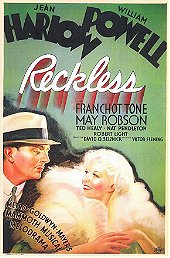What a curio 1935’s Reckless is. Not just for the backstage dynamics involved in its making but the morbid bits of autobiography and uneasy tonal switches between screwball musical comedy and torrid melodrama. With the Pre-Code years behind them, MGM sought to turn Jean Harlow’s rounded figure into a square leading lady type. Reckless was one of many attempts at softening and desexing the blonde bombshell’s screen image.
Producer David O. Selznick based this story loosely on the true-life tale of the Libby Holman murder scandal. Holman was a torch singer who married a tobacco heir named Zachary Smith Reynolds. He died of a gunshot wound to the head under questionable circumstances during a party in 1932. The scandal was huge news until the Reynolds family dropped its legal actions against Holman in 1933. Whether or not he committed suicide or is murder is a bit muddled, but the basic framework of the story remains the same in Reckless, released just two years after that scandal’s closure.
Original conceived as a film for Joan Crawford, and the part seems tailor-made for her combination of hard scrabble dame and sexually empowered tough cookie. She was eventually replaced by Jean Harlow as the studio wanted to build off her real-life romance with star William Powell, here playing supportive friend that nurses a not-so-secret love for her, but there was also something in Harlow’s past that bled into this film’s premise. Her second husband, Paul Bern, also died of a gunshot to the head under mysterious circumstances. Harlow was understandably reluctant to take the part but Powell convinced her so she would not get suspended.
What emerges from all this complicated blurry of fact and fiction is a confused movie that is fascinating for all its messiness. Harlow gives a credible dramatic performance that proves she had a real future as a more respectable leading lady as she matured away from the laughing vamp roles of the early-30s. What the film can’t disguise is her inability to dance and sing. Sure, the dubbing is pretty good as they matched her throatier vocals, but there’s no mistaking the creative editing to hide the doubles and her limited movements.
She’s far better in the romantic bits involving Franchot Tone, her frequent leading man and one of the era’s handsomest stars, and playful banter with Powell, or in verbally dressing down the high society types that look down upon her. This is the tough, ribald Harlow that we all know and love shining through in a different genre and doing a commendable job of it. She’s quite fun opposite Rosalind Russell in full rounded vowels mode as the woman Tone left behind to marry Harlow. It’s one of Russell’s many thankless roles before films like Craig’s Wife, The Woman, and His Girl Friday demonstrated her greatest attributes and versatility as an actress.
But it was clear that Selznick and director Victor Fleming didn’t really know what do with a script that was purely a hodgepodge of musical interludes, a subplot involving Harlow’s starlet trying to make good by marrying a rich boy, the rich boy feeling shamed for marrying an entertainer and committing suicide, and her eventual romantic rescue with Powell, and a custody battle. It’s crazy stuff that never coheres into a neat script, but it’s compulsively watchable for being so damn odd.
 Login
Login